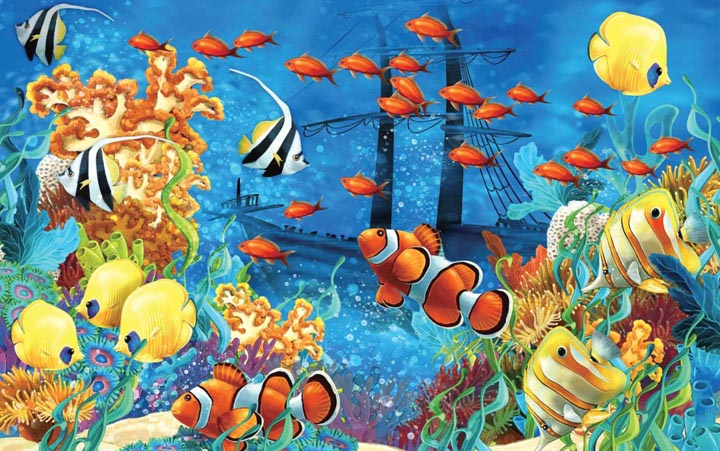





The world's oceans are filled with thousands of living things. Scientists believe that thousands of species have yet to be discovered.
Many ocean plants either float on the surface or grow in shallow water. And just like plants on the land, plants in the ocean need sunlight to grow. The deepest parts of the ocean do not contain plant life because sunlight cannot reach deep into the ocean.
A common type of plant in the ocean is phytoplankton. These plants are very tiny, but they give off more oxygen than any other plants on Earth. Seaweed is a type of plant that floats on the water. It can be used for food as well as material for housing, ropes, and baskets.
Kelp is an ocean plant that can reach up to 80 metres in length! This mainly brown plant is the largest in the world. It can grow 60 centimetres a day, but needs a lot of sunlight to survive.
There is animal life throughout the ocean. Coral is a common ocean animal, although many people think it is a plant. It is very colourful and has tentacles for catching small fi sh
There are many types of fi sh living in the oceans including tuna, sharks, eels, and stingrays. And in addition to fi sh, there are many mammals in the ocean including dolphins, whales, seals, and manatees.
Other animals commonly found in the ocean are octopus, lobster, crabs, jellyfish, squid, and many more. Still other animals live in the ocean as well as on the land. These animals include sea turtles, saltwater crocodiles, and polar bears. There are also many sea birds that rely on the ocean for food. These birds include penguins, pelicans, puffi ns, gulls, and many others.
Word List
tentacles : limbs similar to arms or legs
species : various types of plants and animals
You Practice
I. Answer the following questions.
1) What are some examples of plants that live in the ocean?
2) What are some examples of animals that live in the ocean?
3) What is an ocean plant that looks like an animal?
4) Why is there no plant life very deep in the ocean?
5) What are some examples of sea birds?
II. Word power—Use these words from the reading in sentences of your own.
1) tentacles ______________________________________________
2) kelp _________________________________________________
3) sunlight ______________________________________________
4) coral _________________________________________________
5) species _______________________________________________
III. True / False / Not Given—Write T if the sentence is true, F if it is not true, or NG if there is no information about this sentence.
____ 1) Most ocean plants are found in deep water.
____ 2) Small fis often eat coral.
____ 3) Kelp grows very quickly.
____ 4) Crocodiles live only on land.
____ 5) Phytoplankton is very large.